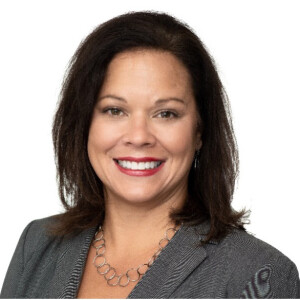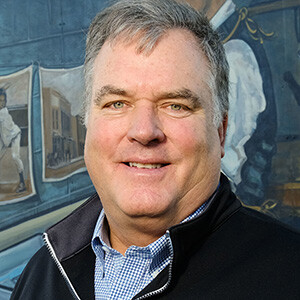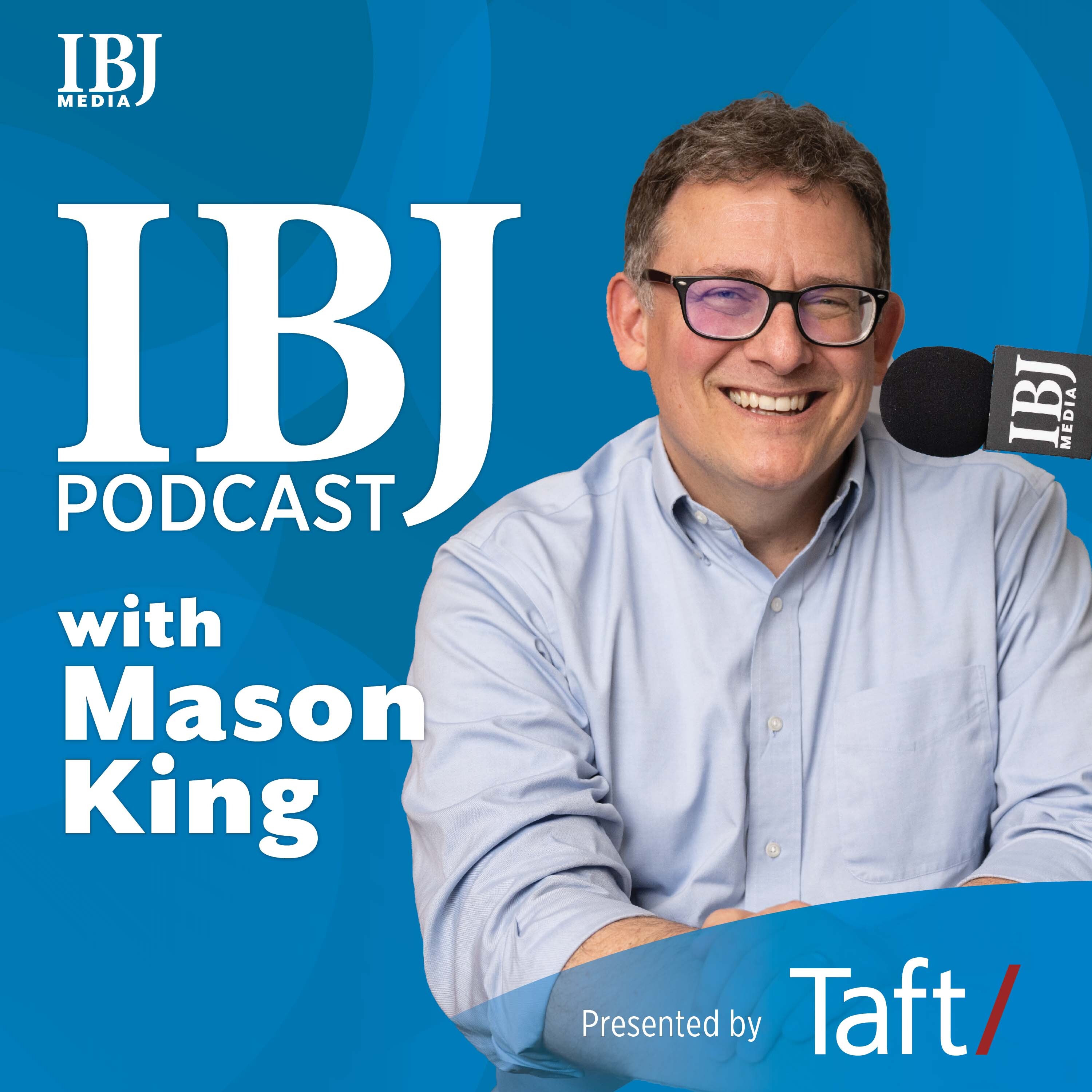Episodes

Monday Apr 17, 2023
Bosma VP: ‘I didn’t know how to be someone who was blind’
Monday Apr 17, 2023
Monday Apr 17, 2023
You might recognize Indianapolis-based Bosma Enterprises as a not-for-profit that helps Indiana residents who are blind or visually impaired. Its business model includes providing products and services for the public and private sector. This provides jobs for people with vision loss who otherwise would face a 70% unemployment rate. In fact, more than half of Bosma’s employees are blind or visually impaired—including its vice president of external affairs, Lise Pace.
She was climbing the ladder in the banking industry in the early 1990s when she learned that she would eventually lose her sight to a disease called retinitis pigmentosa. Married and the mother of a young son, she slowly retreated into a dark and isolated life as she lost most of her sight, stopped working and became a stay-at-home mom. As she says, “I didn’t know how to be someone who was blind.”
In this week’s episode of the IBJ Podcast, Pace tells the story of how her son inspired her to break out of a years-long funk and start volunteering. That led to a full-time job at Bosma and then a raft of promotions that brought her to her current position as a company executive. You could see her as a prime example of how someone with limited sight can excel in the corporate world. Indeed, one of Bosma’s missions is to help clients learn the skills required for succeeding in almost any business environment. But as Pace acknowledges, employers considering visually impaired applicants also need to see beyond sight impediments and trust the results from past work history.

Sunday Apr 09, 2023
Sunday Apr 09, 2023
In 1979, musician Chuck Surack started a business in Fort Wayne called Sweetwater Sound by creating a mobile recording studio in a Volkswagen Bus. Fast-forward a bit more than four decades, and Sweetwater has evolved into one of the nation’s most prominent e-commerce sites for musical instruments and audio gear, with $1.6 billion in sales for 2022. Surack and his wife, Lisa, had total ownership of the company until 2021 when they sold a big stake to a private equity firm.
The Suracks have used that money to help further their already extensive philanthropic giving. Chuck also has more time to focus on Surack Enterprises, a collection of companies unrelated to Sweetwater, including several that stem from his interest in aviation. And that’s the reason why Chuck has been in the news in Indianapolis in recent weeks. The Indianapolis Airport Authority wants to decommission the Indianapolis Downtown Heliport, a move that’s supported by the city of Indianapolis due to the site’s attractiveness for redevelopment. Chuck is helping lead the charge to persuade the Federal Aviation Administration to deny permission to decommission the heliport. Chuck has a helicopter charter company that uses the heliport, but he also joins aviation experts and the Indiana Department of Transportation in arguing that the heliport is uniquely positioned to advantage of new developments in urban aviation. That includes electric aircraft that can take off and land vertically.
In this week’s edition of the IBJ Podcast, Surack sheds more light on his decision to sell a controlling stake in Sweetwater and step away from day-to-day operations. And he explains the reasoning behind his desire to keep the heliport open.
The IBJ Podcast is brought to you by Taft.

Sunday Apr 02, 2023
Sunday Apr 02, 2023
In the 38 years that Steve Sanner has owned and operated Jiffy Lube oil change shops in Indiana, he has laid down some serious tread marks. He is owner and president of Jiffy Lube of Indiana, which counts 51 locations and about 510 employees altogether. That’s the vast majority of the Jiffy Lubes in the state. But he hasn’t been content to simply make his mark as a major Jiffy Lube franchisee. He has volunteered at the highest levels of some of central Indiana’s highest profile organizations, including the Indiana Sports Corp., the local organizing committee for the Big Ten Football Championship and the Washington Township Schools Foundation. And he has used his Jiffy Lubes as a platform for some surprising community-minded initiatives. He has supported Indiana artists by commissioning 30 murals for his stores. He’s kicking off a campaign called “No ticket, let’s fix it,” in which police officers around the state give motorists $25 Jiffy Lube gift cards to get minor car repairs, at a total retail value so far of $300,000. It’s a great way to get motorists into Jiffy Lube, but Sanner says he also wants to promote positive interactions between police and motorists while keeping roads safer.
Sanner is the guest for this week’s edition of the IBJ Podcast. He starts with a few wild stories about his early days as an entrepreneur and how he got a foothold as a Jiffy Lube franchisee. He reacts to some of the common complaints that consumers have about oil change shops. And he talks at length about his secondary career as a volunteer, including being in charge of all of the laundry in the March Madness bubble when Indianapolis hosted all of the NCAA men’s basketball tournament in 2021.
The IBJ Podcast is brought to you by Taft.

Sunday Mar 26, 2023
How Homefield sprints to make apparel for Cinderellas of March Madness
Sunday Mar 26, 2023
Sunday Mar 26, 2023
The owners of Homefield, a maker of T-shirts, sweatshirts, and other apparel for college sports fans, haven’t necessarily been upset with all of the upsets during March Madness this year. The firm was founded by recent Indiana University graduate Connor Hitchcock and his wife, Christa, built off of a side project called Hoosier Proud. It seems like college gear is everywhere, and that initially gave Connor pause when considering whether to take the Indiana-focused venture national. But he and Christa landed on a formula to help Homefield to stand out: Using premium materials and creating unusual designs that draw on a school’s vintage iconography, and then moving at the speed of the internet when a particular school hits big.
So, for example, in the first few hours after Fairleigh Dickinson University beat Purdue in the first round of the men’s tournament this year, Homefield was in touch with licensing officials for FDU, designing a series of shirts and notifying its followers on Twitter. It did the same thing last year when St. Peters University made a run in the tournament. Both schools are squarely in Homefield’s comfort zone as small universities that don’t necessarily have robust apparel programs. In this week’s edition of the IBJ Podcast, Connor and Christa explain how they parlayed their success with small schools into agreements with the bigger names. They also dig into how they landed on Homefield’s winning strategy and how they’ve grown the firm to 40 employees in five years while maintaining a four-day workweek and keeping the emphasis on their staff’s quality of life. That includes all weekends off, even during the tournament.
The IBJ Podcast is brought to you by Taft.

Monday Mar 20, 2023
Are apartments the future of downtown Indianapolis?
Monday Mar 20, 2023
Monday Mar 20, 2023
After the immediate fallout of the Great Recession, apartment development in downtown Indianapolis surged. Just in the last decade, the number of downtown apartment units has more than doubled to the current total of about 15,000 units.
Indianapolis and other major cities across the nation are trying to encourage apartment development, especially as downtowns face an existential crisis brought about by the pandemic—namely, the loss of office workers in their downtown cores to remote working. One of the hottest trends is to take existing office towers and convert them into apartment buildings. And it’s happening with other major commercial structures, like downtown malls.
We’re seeing that now in Indianapolis, with the conversion of the AT&T building and the plans for the Gold Building. The redevelopment of Circle Centre Mall very likely will have apartments, and as the city tries to find new uses for past-their-prime municipal properties, it’s often making residential uses a priority.
For this week’s edition of the podcast, we have a three-person panel to explore the reasons behind the recent surge, the city’s desire to encourage apartment development, and future prospects for continued development and how that could affect downtown. Joining us are apartment market specialist George Tikijian, real estate developer Eric Gershman and deputy mayor of economic development Scarlett Andrews. Here’s our conversation.
The IBJ Podcast is brought to you by Taft.

Monday Mar 13, 2023
Pete The Planner on the new rules for saving money
Monday Mar 13, 2023
Monday Mar 13, 2023
The Federal Reserve is expected to raise interest rates again next week as it continues to try to cool inflation. The silver lining is that when lending rates rise, savings rates also rise. It’s not unusual now to see certificates of deposits with 4% or 5% annual yields locked in over 12 to 24 months. Money market accounts are now paying healthy returns as well. Millennials and members of Gen Z should take note, because they probably haven’t experienced interest rates this high for savings in their adult lives.
It's difficult to get many Americans to put away an appropriate amount of money for retirement or a financial emergency. Late last year, Congress passed a significant revision to the rules for retirement plans with the intent of extending and expanding your saving opportunities and ability to put away money for retirement. It’s not just for folks preparing to hobble across the finish line. The changes also can help people still paying off their college loans and those who need to establish their first emergency funds.
For this week’s podcast, IBJ columnist Pete Dunn, aka Pete The Planner, explains these new opportunities for savings. He also shares a tip for avoiding an interest-rate trap that current homeowners could fall into if they try to level up on housing.
The IBJ Podcast is brought to you by Taft.

Monday Mar 06, 2023
At Legislature’s midpoint, which bills survived and which bills are toast?
Monday Mar 06, 2023
Monday Mar 06, 2023
The Indiana General Assembly just reached the midpoint of its 2023 legislative session and passed some deadlines for advancing bills, which has pushed at least two-thirds of them back to the curb—at least for this session. So this is a great time to take stock of the bills that made the cut and those that tanked.
As usual, education funding has been at the center of major debate. Lawmakers also are hip-deep in social issues, such as so-called “ESG investing” and potential bans on library books some people believe are inappropriate for minors. The Legislature likes to trumpet its efforts to make the state more business-friendly, and different ways to lower business taxes have been under discussion.
For this week’s edition of the IBJ Podcast, regular host Mason King is turning the discussion over to Managing Editor Greg Weaver, who’s been covering state government for decades, and IBJ statehouse reporter Peter Blanchard. And they have invited a guest to help flesh out the discussion: Casey Smith, a reporter for Indiana Capital Chronicle, who recently authored a scoop on a major omission in the Indiana House Republicans’ school funding plan.
The IBJ Podcast is brought to you by Taft.

Monday Feb 27, 2023
Is downtown safe? Ask two business owners who reached different conclusions.
Monday Feb 27, 2023
Monday Feb 27, 2023
One of the most persistent questions about downtown Indianapolis since its 1980s resurgence has been, “Is downtown safe?” In the Feb. 17 issue of IBJ, reporters Mickey Shuey and Taylor Wooten presented statistics for violent and nonviolent crime indicating that downtown remains one of the city’s safest areas, in particular in terms of crimes per capita.
Here’s the rub: Statistics often don’t matter as much as perception. And good luck quoting statistics to someone who has been the victim of a crime. Since safety is a prime concern of business owners and executives whose operations are based downtown, IBJ Podcast host Mason King spoke to two entrepreneurs who have drawn different conclusions about downtown safety and made very different decisions about their downtown operations.
Greg Harris is the founder of Backhaul Direct, and Andrew Elsener is a co-founder of Spot (formerly known as Spot Freight). Harris decided to pack up and relocate Backhaul Direct’s offices to Fishers after being attacked downtown and hearing other employee concerns about safety. Meanwhile, Elsener decided to open an additional office downtown—although he has concerns about incidents of theft and the shaky state of some downtown infrastructure. In fact, Elsener recently moved his entire family to the Mile Square, just a block north of Monument Circle.
The IBJ Podcast is brought to you by Taft.

Friday Feb 17, 2023
Downtown fixture Wheeler Mission on verge of big transition
Friday Feb 17, 2023
Friday Feb 17, 2023
Wheeler Mission has been an integral part of downtown for more than 100 years and is intrinsically linked to quality of life issues and downtown’s image. It’s now in the middle of its first leadership transition in 33 years.
When Rick Alvis became president and CEO in 1990, Wheeler Mission had 17 employees and an annual budget of about $700,000. Today, it has about 200 employees and an annual budget of nearly $20 million. On any given night, it provides shelter for about 550 people, which is about a third of all people experiencing homelessness in Indianapolis. And it’s widely known for its shelter services—to the chagrin of some downtown residents—although those services account for just one spoke in a four-pronged strategy to help men, women and children get the basic services they need, acquire job skills, move to stable housing and eventually become self-sufficient.
Now 70 years old, Alvis is retiring soon and helping ease the transition for his successor, Perry Hines, who became Wheeler’s chief development officer in 2021. In this week’s edition of the IBJ Podcast, Alvis and Hines discuss Wheeler’s evolution over the last three decades, perceptions of Wheeler in the community, perceptions of the homeless population downtown in recent years and why they think it’s important that Wheeler remain based downtown.
The IBJ Podcast is brought to you by Taft.

Monday Feb 13, 2023
He stitched handbags in his Irvington basement, and now it’s a $1M business
Monday Feb 13, 2023
Monday Feb 13, 2023
In his mid-20s, Christian Resiak decided to learn how to hand-stitch leather handbags. He went to thrift stores, bought all of the leather jackets he could find and set up a workspace in his basement. He sold his first bag on Etsy within a month. He called his fledgling company Howl + Hide, partly in reference to his talkative Siberian Husky. Eight years later, Resiak has built Howl + Hide into a million-dollar business with 17 employees without the help of any investors or bank financing.
Howl + Hide’s flagship location in Fountain Square doubles as its main retail site—where it sells a wide variety of handbags, tote bags, duffels, keychains and wallets—and its main production facility. But that will change in the near future as Resiak plans to at least double his employee base and double—maybe triple—his sales this year, with some partnerships with national brands on the way. In conversation with podcast host Mason King, Resiak details the process of building the business from scratch and his grand plan to become a global brand.
The IBJ Podcast is brought to you by Taft.


